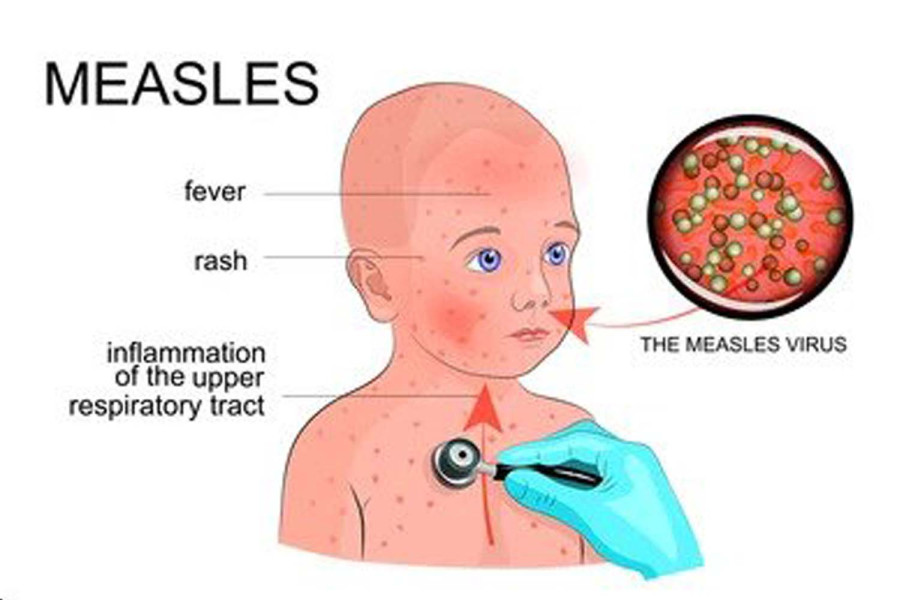Health
Measles breaks out in Valley’s Aarubari
Four students of a monastery-run school in Gokarneshwar have tested positive. Their health is said to be normal.
Arjun Poudel
The threat of measles now looms over Kathmandu Valley.
Measles outbreak has been confirmed in ward 9 of Gokarneshwar Municipality in the valley.
Of the five blood samples of students of an Aarubari-based Buddhist school run by a monastery, four tested positive for the measles virus, according to municipality officials.
“Yes, an outbreak of measles virus was confirmed today [Wednesday] in our municipality,” said Hari Prasad Upadhyaya, health coordinator of the municipality. “The conditions of all infected children are normal.”
Measles is a highly contagious viral disease transmitted through fluids from the nose, mouth or throat of an infected person. It can be potentially deadly for the unvaccinated people.
Nepal had committed to eliminating measles by 2023 after missing the earlier deadline of 2019. To declare measles as eliminated, the number of cases should be less than five per 1,000,000 people throughout the year.
However, the deadly virus was reported in over 14 districts across the country at the start of 2023. At least one child died and hundreds of others were infected with the disease.
And now an outbreak of the virus has been confirmed in the Kathmandu Valley, which shows a significant gap in Nepal's routine vaccination programme. A recent report of the Nepal Demographic and Health Survey-2022 carried out by the Ministry of Health and Population shows that four percent of children in the 12-23 month age group have received no vaccination.
This figure was just one percent in 2016, and the rapid surge in the number of unvaccinated children poses a serious threat to the country’s achievements in immunisation made over the years through huge investments, child health experts warn.
The Ministry of Health and Population has now extended the deadline of measles elimination to 2026.
According to Upadhyaya of Gokarneshwar Municipality, blood samples of infected children were tested at the National Public Health Laboratory, which confirmed measles. At least 15 children under 15 years of age, living in the school's hostel, have measles symptoms. Those with symptoms have been isolated, according to officials.
As many as 560 people—students, teachers and helpers—live in the hostel. Most students pursuing Buddhist studies come from districts outside the Valley, municipality officials said.
Health officials say most of the infected children are unvaccinated—either they have never received any vaccine or not completed routine vaccination.
Child health experts say a low vaccination coverage, floating population, lack of public awareness about the importance of vaccines and apathy of the government agencies concerned to plug the loopholes are some reasons behind the regular outbreaks of measles in different parts of the country.
Doctors say people of all age groups are vulnerable. Underage children, pregnant women, elderly people and those with weak immunity such as HIV-infected people are highly susceptible to measles.
Early measles symptoms, which usually appear 10-12 days after infection, include high fever, runny nose, bloodshot eyes and white tiny spots inside the mouth. Several days later, rashes develop on the face, upper neck and other parts of the body.
Some people may suffer from severe complications, such as pneumonia and encephalitis, and these diseases may also lead to death.
Measles was endemic in Nepal and an average of 90,000 cases were recorded every year from 1994 to 2004. Routine measles vaccination began in the country in 1979, starting with three districts. The campaign was made nationwide after 10 years. Still, measles continues to stalk children across the country.




 8.12°C Kathmandu
8.12°C Kathmandu















